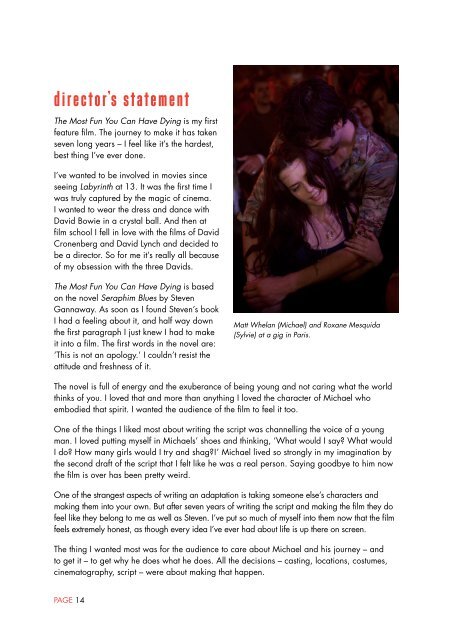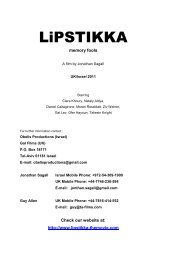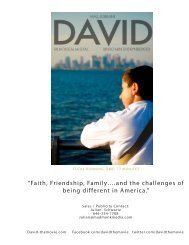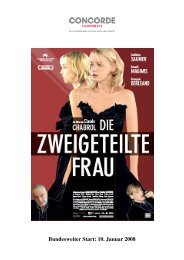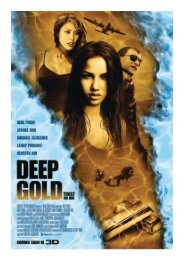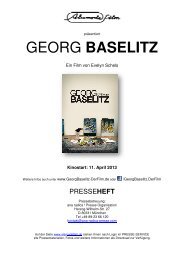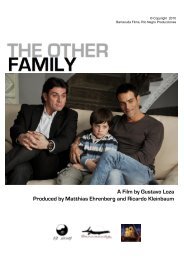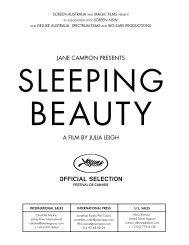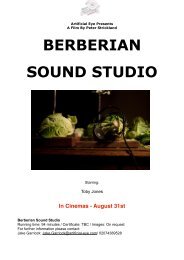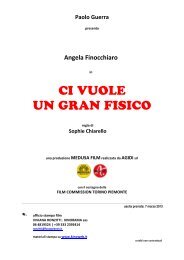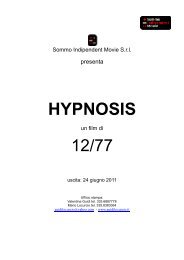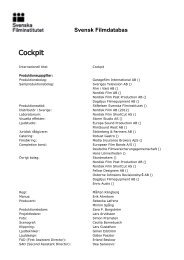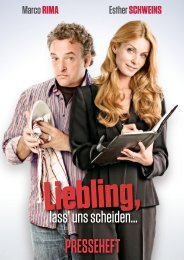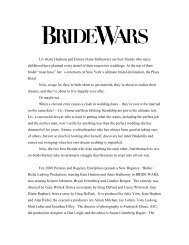the most fun you can have dying - FDb.cz
the most fun you can have dying - FDb.cz
the most fun you can have dying - FDb.cz
Create successful ePaper yourself
Turn your PDF publications into a flip-book with our unique Google optimized e-Paper software.
director’s statement<br />
The Most Fun You Can Have Dying is my first<br />
feature film. The journey to make it has taken<br />
seven long years – I feel like it’s <strong>the</strong> hardest,<br />
best thing I’ve ever done.<br />
I’ve wanted to be involved in movies since<br />
seeing Labyrinth at 13. It was <strong>the</strong> first time I<br />
was truly captured by <strong>the</strong> magic of cinema.<br />
I wanted to wear <strong>the</strong> dress and dance with<br />
David Bowie in a crystal ball. And <strong>the</strong>n at<br />
film school I fell in love with <strong>the</strong> films of David<br />
Cronenberg and David Lynch and decided to<br />
be a director. So for me it’s really all because<br />
of my obsession with <strong>the</strong> three Davids.<br />
The Most Fun You Can Have Dying is based<br />
on <strong>the</strong> novel Seraphim Blues by Steven<br />
Gannaway. As soon as I found Steven’s book<br />
I had a feeling about it, and half way down<br />
<strong>the</strong> first paragraph I just knew I had to make<br />
it into a film. The first words in <strong>the</strong> novel are:<br />
‘This is not an apology.’ I couldn’t resist <strong>the</strong><br />
attitude and freshness of it.<br />
The novel is full of energy and <strong>the</strong> exuberance of being <strong>you</strong>ng and not caring what <strong>the</strong> world<br />
thinks of <strong>you</strong>. I loved that and more than anything I loved <strong>the</strong> character of Michael who<br />
embodied that spirit. I wanted <strong>the</strong> audience of <strong>the</strong> film to feel it too.<br />
One of <strong>the</strong> things I liked <strong>most</strong> about writing <strong>the</strong> script was channelling <strong>the</strong> voice of a <strong>you</strong>ng<br />
man. I loved putting myself in Michaels’ shoes and thinking, ‘What would I say? What would<br />
I do? How many girls would I try and shag?!’ Michael lived so strongly in my imagination by<br />
<strong>the</strong> second draft of <strong>the</strong> script that I felt like he was a real person. Saying goodbye to him now<br />
<strong>the</strong> film is over has been pretty weird.<br />
One of <strong>the</strong> strangest aspects of writing an adaptation is taking someone else’s characters and<br />
making <strong>the</strong>m into <strong>you</strong>r own. But after seven years of writing <strong>the</strong> script and making <strong>the</strong> film <strong>the</strong>y do<br />
feel like <strong>the</strong>y belong to me as well as Steven. I’ve put so much of myself into <strong>the</strong>m now that <strong>the</strong> film<br />
feels extremely honest, as though every idea I’ve ever had about life is up <strong>the</strong>re on screen.<br />
The thing I wanted <strong>most</strong> was for <strong>the</strong> audience to care about Michael and his journey – and<br />
to get it – to get why he does what he does. All <strong>the</strong> decisions – casting, locations, costumes,<br />
cinematography, script – were about making that happen.<br />
PAGE 14<br />
Matt Whelan (Michael) and Roxane Mesquida<br />
(Sylvie) at a gig in Paris.


